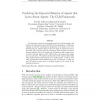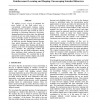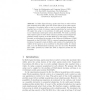53 search results - page 5 / 11 » Shaping multi-agent systems with gradient reinforcement lear... |
105
click to vote
NIPS
2001
15 years 2 months ago
2001
Policy gradient methods for reinforcement learning avoid some of the undesirable properties of the value function approaches, such as policy degradation (Baxter and Bartlett, 2001...
102
click to vote
CORR
2000
Springer
15 years 1 months ago
2000
Springer
We describe a framework and equations used to model and predict the behavior of multi-agent systems (MASs) with learning agents. A difference equation is used for calculating the ...
ICML
2002
IEEE
16 years 2 months ago
2002
IEEE
We explore dynamic shaping to integrate our prior beliefs of the final policy into a conventional reinforcement learning system. Shaping provides a positive or negative artificial...
104
click to vote
PPSN
2004
Springer
15 years 6 months ago
2004
Springer
In Multi-Agent learning, agents must learn to select actions that maximize their utility given the action choices of the other agents. Cooperative Coevolution offers a way to evol...
118
click to vote
ALIFE
2002
15 years 1 months ago
2002
In this paper, we study the relationship between the two techniques known as ant colony optimization (aco) and stochastic gradient descent. More precisely, we show that some empir...



